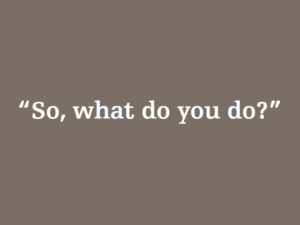On a personal note….
I haven’t written in some months due to the fact that life got in the way. An engagement, a house renovation, a move that combined two households, a death of a grandfather, a near death and hospitalization of a grandmother, identity theft, vehicle theft, and loss of health insurance will do that to a woman….even Steel Magnolias bruise and bend. Yet I am consistently like a bad penny: I just keep turning up and will continue to offer my opinions (for whatever they are worth to others) for as long as I am able. I intend to spend the next little bit writing through all of the topics I have wanted to cover and yet did not have the time to do so in the last few months, so bear with me as I bear witness and I hope that I can offer insight/ explanation as we go along together.
And now back to the reason you’re here….
“What do you do?”
People ask this of one another because we search for common ground and for safe topics in small talk. Alas, my job description usually isn’t anything like that. People see the term “political consultant” and “lobbyist” as a loaded gun, aimed at their rights, their perceptions of how things should be, or they see me as some sort of elite class.
I repeatedly have to tell them it’s really not anything remotely like what you see on House of Cards.
I am sincerely not powerful and my work is more on the side of being kind to everyone- even when they are not kind to me rather than passionately debating legislators or playing puppet master behind the scenes. I am not debating that the Remy Denton types of lobbyists exist, I am just here to tell you: that isn’t me.
I typically answer that question with a shoulder shrug and the factual statement, “I talk to people.” Many times before I have also asserted that I think a monkey could do my job. To be honest, there are probably primates that are more fully functioning than a LOT of people in their jobs, but I digress…Now that I have had the fortune of meeting a number of people who are very book-smart but have zero ability to communicate effectively nor manage a filter on themselves, I have come to value my own diplomacy skills a bit better. Not everyone can take rejection well, nor know they are being purposefully left out of conversations and still try to make a difference.
I would say these are my greatest gifts.
Hearing “no” is simply part of the process. Brush it off. The more important question is always, “what will get you to “yes”?”
My clients are namely nonprofits, and I take a lot of pride in that. I do not make as much money as some, but I appreciate the ability to sleep well at night. I have always seen politics as a game to play, and I hope I can do my part to level the playing field for as many folks as possible.
So in that vein, I thought I would try to take this post and offer some of what I do for free in the link at the bottom of the page.
This is an advocacy training I have given time and again. A lot of this presentation is basic civics, but I hope folks can find some nuggets of wisdom in this presentation I have given in advocacy trainings. In a post on the last day of legislative session last year, I posted links to the Rules of the House and the Senate. The parliamentary procedure used by the House most resembles Robert’s Rules of Order, which is common among board meetings around the world. The Senate uses another parliamentary procedure called Mason’s Rules, which albeit similar to Robert’s, is different in certain ways and when one is following the debates on the floor, knowing the rules helps to understand why certain things happen.
Moreover, I hope that beyond the discussion of process, you readers out there will recognize my work is ENTIRELY built on relationships, and that is good. Because the more YOU build on those yourself (which although IS time consuming, it is also really the easiest part), the more influence YOU too will have on politics and business.
Some basic rules apply in every work setting:
- Be kind
- Be honest
- Don’t betray people’s trust
- It is more important who you know than what you know
- It is more important to be gracious than right
- Give credit in public
- Give correction in private
- Keep the company of those who will keep you humble
- Always try to understand the other side of the argument
- Know that the toes that you step on today may be connected to the butt you have to kiss tomorrow
Hope folks find this helpful!

But being a reporter is just like (spoiler alert) being pushed in front of a speeding subway.